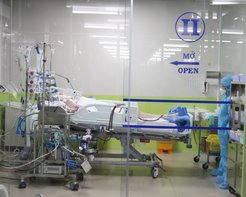Vietnam’s Patient No. 91
Autorin: Kirsten W. Endres
Vietnam has been remarkably successful during the Covid-19 crisis. With a total of only confirmed 349 cases (326 recovered) and zero deaths as of June 20, Politico ranked the country as the global best performer in confronting the pandemic.i Since the 2003 SARS outbreak, Vietnam has continuously strengthened its pandemic preparedness.ii What at first glance appeared as a draconian overreaction soon turned out to be a sensible package of measures.iii Strategic testing, aggressive contact tracing, mass quarantining and effective public information campaigns have all been key to the country’s achievement in fighting the pandemic. As one reporter remarked, “Vietnam's lack of coronavirus deaths remains the envy of the world”.iv Until very recently, the only person who could have possibly spoiled this positive record was a British pilot who became known as Vietnam's Covid-19 Patient No. 91.
The 43-year old Briton had started to work for Vietnam’s national carrier Vietnam Airlines in December 2019. On March 18, he was admitted to the Ho Chi Minh City Hospital for Tropical Diseases with a fever and cough and tested positive for the coronavirus. A few days earlier, on March 14, he had celebrated Saint Patrick’s Day at the Buddha Bar, a popular expat hang-out in Ho Chi Minh City’s District 2. The party triggered at least 17 Covid-19 infections, making it the biggest cluster in Vietnam’s south to-date.

Unlike most other patients in the country, the Brit did not recover quickly from the symptoms that ravaged his body. His condition soon turned critical. In early May, after more than a month of extracorporeal membrane oxygenation (ECMO), a bypass system that allows the lung to rest and recover from damage, a CT scan revealed that his lung capacity had reduced to only ten percent. On May 22, after having been cleared of the virus, “patient no. 91” was transferred to the intensive care unit of Cho Ray hospital, the largest general hospital in Ho Chi Minh City. Medical practitioners and experts from across Vietnam convened through a series of teleconference to discuss the best treatment options for the pilot. At that time, a lung transplant seemed the only option to save his life. More than 60 people from various walks of life offered parts of their lungs for transplantation, although doctors gave priority to finding a registered brain-dead donor. However, soon enough the pilot’s health started to improve. On June 3, after nearly two months of extracorporeal life support, the pilot was finally disconnected from the ECMO unit. Ten days later, he was able to breathe again without the assistance of a ventilator. His lung capacity has since recovered to ninety per cent. The Scotsman is currently preparing to leave the hospital and return to his home country for further convalescence. “If I had been anywhere else on the planet, I'd be dead”, he said in an interview given to the Vietnamese newspaper Tuoi Tre (Youth).v
With health systems brought to the brink of collapse by the pandemic in many parts of the world, his assessment might well be accurate. For market-socialist Vietnam, however, the unlikely cure provided a unique opportunity. For one, it was a chance to demonstrate – not only to the world but also to its own people – the capability of its medical system, the modernity of its medical equipment and facilities, the competency of its doctors and medical staff, and their overall dedication to saving the life of the most critically ill Covid-19 patient in the country who happened to be a foreigner. But it was also a chance for the government to boost its performance-based legitimacy, because the measures implemented to contain the virus had been effective in keeping the number of hospitalizations low in the first place.
Notes
i https://www.politico.com/interactives/2020/ranking-countries-coronavirus-impact/
ii https://blogs.worldbank.org/health/containing-coronavirus-covid-19-lessons-vietnam.
iii https://www.bbc.com/news/world-asia-52628283. See also Samuel J. Williams’s blog entry on Frédéric Keck’s book Avian reservoirs: Virus hunters and birdwatchers in Chinese sentinel posts (2020).
iv https://www.abc.net.au/news/2020-05-13/coronavirus-vietnam-no-deaths-success-in-south-east-asia/12237314?fbclid=IwAR34JGpo8G5d7xHLNn8yP_EyX9eAOjpbUd6NokZpYenYlQZTcALQshqAk-Y.
v https://tuoitrenews.vn/news/features/20200619/if-i-d-been-anywhere-else-on-the-planet-other-than-vietnam-i-d-be-dead-british-pilot/55169.html.
